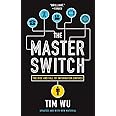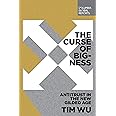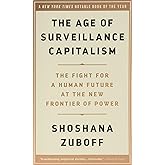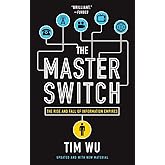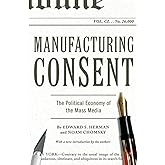Buy new:
-29% $14.24$14.24
FREE delivery January 7 - 9
Ships from: Ecommerce Merch Un-LTD Sold by: Ecommerce Merch Un-LTD
Save with Used - Good
$8.91$8.91
Ships from: Amazon Sold by: Dream Books Co.

Download the free Kindle app and start reading Kindle books instantly on your smartphone, tablet, or computer - no Kindle device required.
Read instantly on your browser with Kindle for Web.
Using your mobile phone camera - scan the code below and download the Kindle app.



 Audible sample
Audible sample The Attention Merchants: The Epic Scramble to Get Inside Our Heads Paperback – Illustrated, September 19, 2017

Explore your book, then jump right back to where you left off with Page Flip.
View high quality images that let you zoom in to take a closer look.
Enjoy features only possible in digital – start reading right away, carry your library with you, adjust the font, create shareable notes and highlights, and more.
Discover additional details about the events, people, and places in your book, with Wikipedia integration.
Purchase options and add-ons
"Dazzling." —Financial Times
Ours is often called an information economy, but at a moment when access to information is virtually unlimited, our attention has become the ultimate commodity. In nearly every moment of our waking lives, we face a barrage of efforts to harvest our attention. This condition is not simply the byproduct of recent technological innovations but the result of more than a century's growth and expansion in the industries that feed on human attention.
Wu’s narrative begins in the nineteenth century, when Benjamin Day discovered he could get rich selling newspapers for a penny. Since then, every new medium—from radio to television to Internet companies such as Google and Facebook—has attained commercial viability and immense riches by turning itself into an advertising platform. Since the early days, the basic business model of “attention merchants” has never changed: free diversion in exchange for a moment of your time, sold in turn to the highest-bidding advertiser.
Full of lively, unexpected storytelling and piercing insight, The Attention Merchants lays bare the true nature of a ubiquitous reality we can no longer afford to accept at face value.
- Print length432 pages
- LanguageEnglish
- PublisherVintage
- Publication dateSeptember 19, 2017
- Dimensions5.19 x 0.95 x 7.93 inches
- ISBN-100804170045
- ISBN-13978-0804170048
Discover the latest buzz-worthy books, from mysteries and romance to humor and nonfiction. Explore more
Frequently bought together

Customers who viewed this item also viewed
Editorial Reviews
Review
The San Francisco Chronicle * The Philadelphia Inquirer * Vox * The Globe and Mail (Toronto)
“Vigorous, entertaining.... Wu describes how the rise of electronic media established human attention as perhaps the world’s most valuable commodity.” —The Boston Globe
“The Attention Merchants is a book of our time, touching on an emerging strain of anxiety about the information age.... A bracing intellectual tour de force.” —The San Francisco Chronicle
“Comprehensive and conscientious, readers are bound to stumble on ideas and episodes of media history that they knew little about. [Wu] writes with elegance and clarity, giving readers the pleasing sensation of walking into a stupendously well-organized closet.” —The New York Times
“A startling and sweeping examination of the increasingly ubiquitous commercial effort to capture and commodify our attention.... We’ve become the consumers, the producers, and the content. We are selling ourselves to ourselves.” —The New Republic
“The book is studded with sharp illustrations of those who have tried to stop the encroachment of advertising on our lives, and usually failed.... Wu dramatizes this push and pull to great effect.” —The New York Times Book Review
“An engaging history of the attention economy.... [Wu] wants to show us how our current conditions arose.” —The Washington Post
“Dazzling.... [Wu] could hardly have chosen a better time to publish a history of attention-grabbing.... He traces a sustained march of marketers further into our lives.” —The Financial Times
“ [An] erudite, energizing, outraging, funny and thorough history of one of humanity's core undertakings—getting other people to care about stuff that matters to you.” —Boing Boing
“Engaging and informative.... [Wu’s] account ... is a must-read.” —The Washington Times
About the Author
Product details
- Publisher : Vintage; Reprint edition (September 19, 2017)
- Language : English
- Paperback : 432 pages
- ISBN-10 : 0804170045
- ISBN-13 : 978-0804170048
- Item Weight : 14.4 ounces
- Dimensions : 5.19 x 0.95 x 7.93 inches
- Best Sellers Rank: #128,924 in Books (See Top 100 in Books)
- #15 in Media & Communications Industry (Books)
- #370 in Popular Culture in Social Sciences
- #439 in Communication Skills
- Customer Reviews:
About the author

Tim Wu is a professor at Columbia Law School, and best known for his development of Net Neutrality.
He is the author of "The Curse of Bigness," "The Attention Merchants," "The Master Switch," and "Who Controls the Internet?"
He previously worked for the White House under President Barack Obama and is a Silicon Valley veteran. He was a law clerk for the United States Supreme Court. He graduated from McGill University (B.Sc.), and Harvard Law School.
Wu has written for the New Yorker, the New York Times, T Magazine, Washington Post, Forbes, Slate magazine, and others, and once worked at Hoo's Dumplings.
Customer reviews
Customer Reviews, including Product Star Ratings help customers to learn more about the product and decide whether it is the right product for them.
To calculate the overall star rating and percentage breakdown by star, we don’t use a simple average. Instead, our system considers things like how recent a review is and if the reviewer bought the item on Amazon. It also analyzed reviews to verify trustworthiness.
Learn more how customers reviews work on AmazonCustomers say
Customers find the book engaging and well-written. They appreciate the insightful content and pacing, describing it as an entertaining read that covers a wide range of topics. The historical account is well-presented and enlightening.
AI-generated from the text of customer reviews
Customers appreciate the well-written historical account of our willingness to trade attention. They find it enlightening and educational, demonstrating the commercial and social dynamics at play. The book has excellent prose and scholarship, raising their consciousness about the attention economy.
"...1 – This is a book that provides a sweeping yet substantive overview of the history of the ways attention merchants have sought out, and taken, our..." Read more
"...Students are split on it. Fast and easy read but, because it isn't a textbook with discussion questions and key terms listed out, they don't find it..." Read more
"...He writes well, very well indeed: the story flows easily, the arguments are clear, and his claims are always interesting, even if you might doubt..." Read more
"...Useful to learn and strongly correlated with the attention economy...." Read more
Customers find the book engaging and informative. They describe it as a useful review of the history of advertising and marketing.
"...3 – This is a book that is really well written – utterly engaging. The Attention Merchants has so many highlight worthy passages...." Read more
"...thought about a brand of soft power that is both ubiquitous and compelling...." Read more
"I loved this book, despite it infecting my mind with the catchy coke song from the 1970s...." Read more
"...medium like an ebook, Fascinating and chilling but always entertaining narration." Read more
Customers find the book provides valuable insights into the attention economy and advertising industry. They find it engaging with thought-provoking historical analogies and anecdotes. The book is well-written with ample notes and explanations.
"...The Attention Merchants has so many highlight worthy passages. Here are a few: The question is always, what shall I pay attention to?..." Read more
"...: the story flows easily, the arguments are clear, and his claims are always interesting, even if you might doubt his conclusions...." Read more
"...available to mass audiences through a mass medium like an ebook, Fascinating and chilling but always entertaining narration." Read more
"...Useful to learn and strongly correlated with the attention economy...." Read more
Customers find the book's pacing good. They say the story flows easily, and the arguments are clear. The subject is interesting and timely, and the book provides a cursory but well-put-together history.
"...Students are split on it. Fast and easy read but, because it isn't a textbook with discussion questions and key terms listed out, they don't find it..." Read more
"...He writes well, very well indeed: the story flows easily, the arguments are clear, and his claims are always interesting, even if you might doubt..." Read more
"...This book is timely and clever...." Read more
"Great book that conducts a cursory, but well put together history of the advertising industry...." Read more
Customers appreciate the book's depth and breadth. They find it informative, covering a wide range of topics with engaging prose.
"...It covers a remarkable range of topics and is engaging throughout. I have recommended it to many of my friends...." Read more
"Extensive and informative. Never dull...." Read more
"Essential to understanding the times. Impeccable prose, breadth and depth of scholarship, insight...." Read more
"Amazing depth and insight to the invisible competition for our mind..." Read more
Top reviews from the United States
There was a problem filtering reviews right now. Please try again later.
- Reviewed in the United States on November 19, 2018Ed Savage, a high-caliber organizational development professional, and a colleague of his, developed the “Rule of Seventeen.” Their rule is: it takes seventeen repetitions for a message to sink in. I thought of this as I worked through The Attention Merchants by Tim Wu; especially in the section of the book that gave the British precursor to, and then the practice of, Nazi propaganda. The simple message: the more fully a messenger can smother an audience with a message, the more fully the message sinks in.
Why is this book worth our time? I have three answers:
#1 – This is a book that provides a sweeping yet substantive overview of the history of the ways attention merchants have sought out, and taken, our attention. (propaganda; advertising; posters, print, radio, television, web, mobile – sweeping!)
#2 – This is a book that reveals the unending competition for our attention. The attention merchants are always hard at work, and very creative in the ways they “hide” what they are doing.
#3 – This is a book that is really well written – utterly engaging.
The Attention Merchants has so many highlight worthy passages. Here are a few:
The question is always, what shall I pay attention to?
Over the coming century, the most vital human resource in need of conservation and protection is likely to be our own consciousness and mental.
… the attention industry, in its many forms, has asked and gained more and more of our waking moments, albeit always, in exchange for new conveniences and diversions, creating a grand bargain that has transformed our lives.
The real purpose of this book is less to persuade you one way or the other, but to get you to see the terms plainly, and, seeing them plainly, demand bargains that reflect the life you want to live.
As William James observed, we must reflect that, when we reach the end of our days, our life experience will equal what we have paid attention to, whether by choice or default. We are at risk, without quite fully realizing it, of living lives that are less our own than we imagine.
The goal of what follows is to help us understand more clearly how the deal went down and what it means for all of us.
As. Mr. Wu led us through the arrival of early, and then the next, and then the next, attention merchants, I made this list. The progression:
• Preachers – the Church was the one institution whose mission depended on galvanizing attention
• Snake Oil Salesmen
• poster creators (Paris) — the posters were practically impossible to ignore.
• British War Propaganda (when “Propaganda” was not a bad word)
• The Ministry for Public Enlightenment and of Propaganda – Hitler, Goebbels, Leni Riefenstahl — total immersion of audience; “mandated” attention
• from sponsors… to “ads”
• from People to Instagram
• from Magazines to Blogs to Twitter and Instagram
• (the illusion of intimacy; the “pretend” self)
• from posters to film and radio to television to computers to hand-held screens
• and now, as part of the “revolt,” Netflix and binge watching
One thing I noticed was the no-longer-with-us brands of yesteryear, like: Ipana, Rinso, and Zenith.
And, here were my five lessons and takeaways from the book:
#1 – First, pay attention to where your attention is going. Learn where it is going!
#2 – Be wary of claims – all claims. (Who is the one who makes the claims? Why do they make such claims?)
#3 – If the advertisers fail, then: who will pay for content (to be developed)?
#4 – Schedule some digital Sabbaths; some intentional times to unplug.
#5 – Commit to the “human reclamation project.”
I am a loyal and appreciative fan of the work of David Halberstam, and I was pleased to see Mr. Wu refer to Halberstam’s classic The Powers that Be.
And, this note: if you have ever wondered about “fake news,” you could read the sections of this book about snake oil salesmen. And, especially, the way that the Camel News Caravan successfully avoided all negative news about the health dangers of smoking.
Should you read this book? Yes. If for no other reason than it is an utterly engaging book to read. But, reading this book will also make you a much more attentive and wary participant in where you place your eyeballs and where you allow your attention to settle. Getting that right can make a world of difference.
- Reviewed in the United States on September 6, 2021I use this book in an intro class where we discuss marketing and persuasion. Great historical overview of key figures and events. The only reason this is not 5 stars is because there are no pictures. When I lecture, I provide examples to supplement the book.
Students are split on it. Fast and easy read but, because it isn't a textbook with discussion questions and key terms listed out, they don't find it the best for a classroom. Some love it and say it is transformative. Others say it is just ok.
- Reviewed in the United States on December 22, 2016Writing histories of soft power – advertising, entertainment, persuasion, etc – has its difficulties. The historians of the hard variety of power can attach their arguments to a battle won, a piece of legislation passed, an election lost, something concrete where impact and significance seem clearer, more obvious. Yet the exercise of soft power is both commonplace and important because it often does shape our lives in a myriad of ways. But how do you prove such claims?
Well Tim Wu has done a masterful job of tracking the story of a changing group of people, mostly men, who have sort to harvest the attention of publics and then sell that attention to a bevy of clients, mostly advertisers of one kind or another. The overall story isn’t new: there have been many fine histories of advertising over the years, and of its effect on culture and consumers. But Wu adds to the chronicle by focusing much of his argument on the modern incarnation of the attention merchants, no longer just newspaper publishers or admen or broadcast moguls but the ones who run the massively popular websites, say a Mark Zuckerberg, that wins our attention by offering an appealing service, a lot of supposedly ‘free stuff.’ Except of course it isn’t quite free, or rather it produces a saleable product, our eyes, that can generate huge profits. And the success of such enterprise shapes the whole character of the internet, just like the fact of advertising shaped first newspapers, then radio, and finally television news and entertainment.
It’s the details of the story that especially intrigue. Thus I was taken by his bio of someone he calls the alchemist, Claude Hopkins, an adman early in the 20th century, whose successes and views had a major impact on the course of marketing throughout the next few decades. Wu has obviously done much research and thought hard about his findings. He writes well, very well indeed: the story flows easily, the arguments are clear, and his claims are always interesting, even if you might doubt his conclusions. So his suggestion a consumer revolt is brewing nowadays I liked, and hope he’s correct, but I doubt – there have been too many such claims in times past but we still live in marketing’s moment. Things change yes, styles of persuasion get updated, but the rule of the persuader persists: so the political consultant may have suffered some hard times in the past election cycle (because so many expensive campaigns failed abysmally), but the triumph of Trump (who doesn’t figure in the book) shows the huckster remains a potent figure in the American mix.
The characters I found most intriguing here, like Hopkins, weren’t just selling our attention but manufacturing attraction, making products or people or causes appealing to the various markets and publics. Because in part our attention to the free stuff doesn’t mean our submission to the wishes of the elites. There’s another step, namely the crafting of the brand or the cause, making something that captivates or, apparently, fills a need. In short the real exercise of soft power came through the efforts of the adman, although now more the ad-maker and public relations counsel, what’s been called the persuasion industry. Sometimes I had the feeling Wu’s approach emphasized attention too much, attraction too little.
But the real point is that Wu’s book provokes thought about a brand of soft power that is both ubiquitous and compelling. The only answer, unfortunately inadequate I think, is to get off the grid – don’t Facebook, don’t tweet, don’t watch television, then you can’t be sold. Except, of course, you then miss out on the free stuff.
Top reviews from other countries
-
 Cliente AmazonReviewed in Spain on March 8, 2022
Cliente AmazonReviewed in Spain on March 8, 20223.0 out of 5 stars Cada pagina tiene un ancho diferente, por lo que es dificultoso pasar páginas.
El acabado es de baja calidad o defectuoso, ya que el ancho de cada página es diferente y eso dificulta manipularlas.
Respecto a WU, excelente.
 El acabado es de baja calidad o defectuoso, ya que el ancho de cada página es diferente y eso dificulta manipularlas.3.0 out of 5 stars Cada pagina tiene un ancho diferente, por lo que es dificultoso pasar páginas.
El acabado es de baja calidad o defectuoso, ya que el ancho de cada página es diferente y eso dificulta manipularlas.3.0 out of 5 stars Cada pagina tiene un ancho diferente, por lo que es dificultoso pasar páginas. Cliente Amazon
Cliente Amazon
Reviewed in Spain on March 8, 2022
Respecto a WU, excelente.
Images in this review


 Amazon CustomerReviewed in India on April 10, 2021
Amazon CustomerReviewed in India on April 10, 20215.0 out of 5 stars Must buy
Great Book
 Guilherme Ledo MoreraReviewed in Brazil on July 3, 2019
Guilherme Ledo MoreraReviewed in Brazil on July 3, 20195.0 out of 5 stars TERRIFIC
Great book! Excelent work on how our society's attention is kept and sold as a commodity!
-
 ClaireReviewed in France on September 13, 2020
ClaireReviewed in France on September 13, 20205.0 out of 5 stars Un régal
Je ne peux pas faire assez de compliments sur ce livre. Quelle écriture, passionnante, basée sur des histoires captivantes. Quelle analyse fine et percutante de la montée en puissance des marchands d'attention. Un régal (glaçant, libérateur) à lire d'urgence!
-
 Daria PacynkoReviewed in Italy on December 27, 2019
Daria PacynkoReviewed in Italy on December 27, 20195.0 out of 5 stars Un libro che devi leggere
Un bel libro







